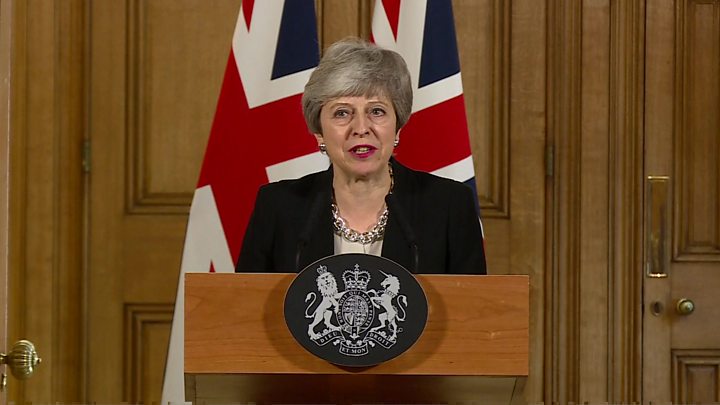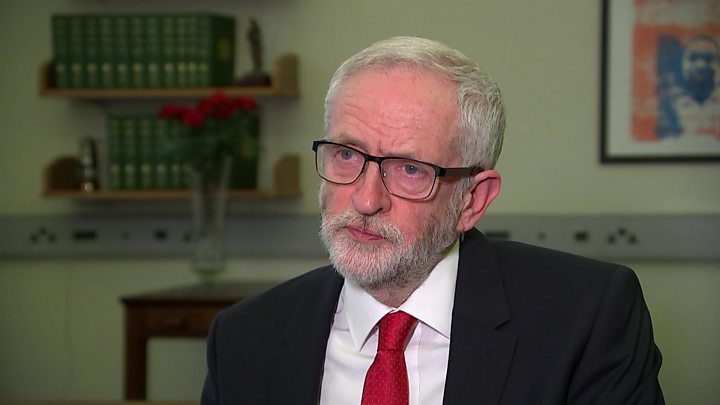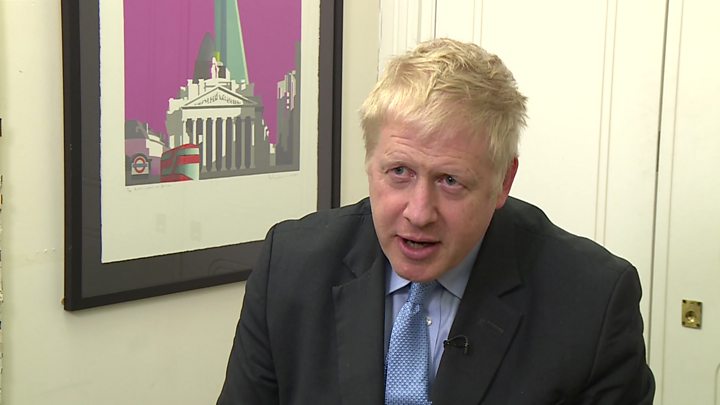
Theresa May will meet Jeremy Corbyn later to see whether there is common ground to break the Brexit deadlock, Brexit Secretary Stephen Barclay says.
He said the “remorseless logic” of MP numbers in the House of Commons meant the UK was heading for an “undesirable” soft Brexit – closer links with the EU.
There were no preconditions for the talks, he said, but it was not a “blank cheque” either.
Mr Corbyn says he wants a customs union and workers’ rights to be priorities.
BBC political editor Laura Kuenssberg said there was not much difference between the government’s version of Brexit and Labour’s version, but there did not seem to be “an enormous amount of confidence” a political consensus could be reached from either party.
The PM’s move to hold talks has angered some Brexiteers, with Wales Minister Nigel Adams resigning his role.
Image copyright
UK Parliament
Nigel Adams told the PM: “You and your cabinet have decided that a deal – cooked up with a Marxist who has never once in his political life put British interest first – is better than no deal.”
Mr Adams said the government was at risk of failing to deliver “the Brexit people voted for” and failing to prevent “the calamity of a Corbyn government”.
Prominent Brexiteer Boris Johnson has accused Mrs May of “entrusting the final handling of Brexit to Labour”.
And Jacob Rees-Mogg, leader of the Eurosceptic European Research Group (ERG) of Tory MPs, described the offer as “deeply unsatisfactory” and accused Mrs May of planning to collaborate with “a known Marxist”.
- Kuenssberg: PM chooses a deal over party unity
- Brexitcast: Theresa’s Choice
- Reality Check: What is Labour’s Brexit plan?
- MPs push to prevent no-deal Brexit in law
But Mr Barclay blamed hard Brexiteers in the ERG who refused to back the PM’s deal.
He told BBC Radio 4’s Today programme: “It’s regrettable that what we have been saying for several months now is coming to pass but that is the remorseless logic of not backing the prime minister’s deal.
“Because the alternative then is to have to seek votes from the opposition benches because 35 of my own colleagues would not support the prime minister’s deal.”
Mr Barclay said the consequence of MPs not passing the PM’s deal was either a “soft Brexit or no Brexit at all”.
“It [a soft Brexit] is undesirable but it’s the remorseless logic of the numbers of the House of Commons,” he said.
He said the EU has said the withdrawal agreement is the only deal available, but he said Labour had expressed more concern about the future relationship – which is contained within the separate political declaration.
The withdrawal agreement includes how much money the UK must pay to the EU as a settlement, details of the transition period, and citizens’ rights – as well as the controversial Irish backstop that aims to avoid a hard border on the island of Ireland.
The political declaration sets out proposals for how the UK’s long term future relationship with the EU will work after Brexit.

Mrs May announced her plan to meet Mr Corbyn – as well as her intention to ask the EU for an extension to the Brexit deadline – after more than seven hours of talks with her cabinet on Tuesday.
Mr Corbyn said he was “very happy” to meet Mrs May and recognised his own “responsibility” to try to break the deadlock.
But the meeting is not expected to take place before this afternoon, at the earliest, says our political editor, who was told by Mr Corbyn’s team that he was not available on Wednesday morning for talks with the PM.
Later in Parliament
Meanwhile, a cross-party group of MPs will attempt to push through legislation to stop a no-deal Brexit.
If passed into law, the bill – presented by Labour MP Yvette Cooper – would require the PM to ask for an extension of Article 50 beyond that deadline.
House of Commons: Wednesday’s approx timings for cross-party bill
14:00 BST – Debate on a bill designed to ensure the government seeks a delay to Article 50 and stop no deal in law due to begin
19:00 – A second reading vote on the bill
22:00 – Committee stage starts (this stage usually starts within a couple of weeks of a bill’s second reading) and finally third reading vote
Thursday – Bill is expected to be considered by the House of Lords
The UK has until 12 April to propose a plan to the EU – which must be accepted by the bloc – or it will leave without a deal on that date.
Mrs May said she wanted to agree a new plan with Mr Corbyn and put it to a vote in the Commons before 10 April – when the EU will hold an emergency summit on Brexit.
She insisted her withdrawal agreement – which was voted down last week – would remain part of the deal.
If there is no agreement, Mrs May said a number of options would be put to MPs “to determine which course to pursue”.
- Brexit: What could happen next?
- Sturgeon: May ‘kicking can’ over Brexit
- Brexit deadlock: The Commons in numbers
In either event, Mrs May said she would ask the EU for a further short extension to hopefully get an agreement passed by Parliament before 22 May, so the UK does not have to take part in European elections.
European Parliament Brexit co-ordinator Guy Verhofstadt, who has previously said he thought a no-deal Brexit was “nearly inevitable”, welcomed Mrs May’s offer of talks with Mr Corbyn.
“Good that PM Theresa may is looking for a cross-party compromise. Better late than never,” he tweeted.
She was for budging. The prime minister has made her priority leaving the EU with a deal, rather than the happy contentment of the Brexiteers in the Tory party.
For so long, Theresa May has been derided by her rivals, inside and outside, for cleaving to the idea that she can get the country and her party through this process intact.
But after her deal was defeated at the hands of Eurosceptics, in the words of one cabinet minister in the room during Tuesday’s marathon session, she tried delivering Brexit with Tory votes – Tory Brexiteers said “No”.
Now she’s going to try to deliver Brexit with Labour votes. In a way, it is as simple as that.
Labour has previously said it has five tests for judging any final Brexit deal, including protecting workers’ rights, establishing a permanent customs union with the EU and securing the same benefits of being in the single market the UK has currently.
Shadow business secretary Rebecca Long-Bailey told the Today programme that Labour was approaching the conversations with “an open mind”.

Northern Ireland’s Democratic Unionist Party – which helps prop up Mrs May’s government but has repeatedly voted against her deal – said: “It remains to be seen if sub-contracting out the future of Brexit to Jeremy Corbyn, someone whom the Conservatives have demonised for four years, will end happily.”
After Mrs May’s statement, the president of the European Council, Donald Tusk, called for patience.
European leaders have been intensifying plans to cope with a possible no-deal, particularly surrounding the border between Northern Ireland and the Republic of Ireland.
- Wednesday 3 April: Theresa May likely to begin talks with Jeremy Corbyn; cross-party group attempts to rule out no-deal in law
- Wednesday 10 April: Emergency summit of EU leaders to consider any UK request for further extension
- Friday 12 April: Brexit day, if UK does not seek / EU does not grant further delay
- 23-26 May: European Parliamentary elections
UK PM to meet opposition for Brexit talks


